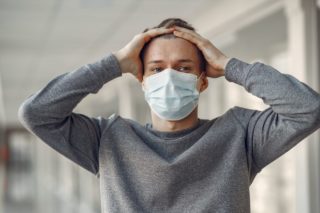If you are feeling uncertain or worried at the moment, or possibly suffering from depression, you’ll be relieved to know that you are not alone. The outbreak of this deadly virus, which was first reported in China, has affected more than one hundred countries including big nations like the U.S and UK.
This resulted in the closure of learning institutions and businesses. Nations have done what they can to control the spread of COVID-19, but even now months later, life isn’t normal anymore.
The new normal is maintaining high standards of hygiene, social distancing, and locking yourself up in your house as much as possible. Self-isolation has proven to reduce the risk of spreading the virus. However, it may set the stage for depression.
According to Victor Fornani, the Managing Director at the Zucker Hillside Hospital, the majority of people have anxiety disorders or pre-existing mood and are highly likely to have a hard time coping with extreme stress. Others who have never been diagnosed with anxiety or depression are now at risk because of the financial instability caused by this pandemic, fear of getting ill, or fear that loved ones will get affected by it.
According to Brittany LeMonda, a senior psychologist at Lenox Hill Hospital, it’s important to know the warning signs of depression to prevent a downward spiral. Some of the warning signs include feeling sad, sleeping too much or insomnia, turning to drugs, poor eating habits, self-isolating more than is necessary and difficulty getting out of bed in the morning. 
Other signs include obsessive thinking patterns, angry outbursts, thoughts of harming oneself, and feeling helpless or hopeless. Loved ones and colleagues must recognize these signs early enough to save the person.
Your thoughts and attitudes greatly determine how you feel and behave. We are going to discuss some of the factors that increase your vulnerability and put you at risk for developing depression. Let’s get started!
Factors Increasing Depression Risk
Learned helplessness
This is a thinking pattern that suggests that individuals have no power over the majority of events in their lives. These individuals are usually passive because they believe that they can’t do anything to solve their problems or relieve their suffering.
Negative thinking
Depressed individuals tend to get stuck in negative thoughts. Unfortunately, this maintains or amplifies negative thinking. For instance, thoughts of an individual suffering from depression following the death of a child or spouse (“I wish I had been a better parent or spouse”) and about coping with the future (“How will close people deal with this”). Thinking about the causes and consequences repeatedly may prevent a depressed person from accepting and coping with reality.
Lack of motivation
Depressed people tend to feel purposeless. This means that any activity or task can become a great challenge. According to Hasler, depression reflects a change in cost-benefit analysis and results in impaired decision-making. Dopamine deficiency may increase valuation costs such as effort and time while decreasing their satisfaction from normal daily interactions and activities. This results in a lack of motivation to act.
Feeling depleted
 According to Andrew Solomon, the opposite of depression is not bliss or happiness but vitality. Individuals with depression don’t have the flexibility to shift their attention away from negativity. As a result, they become more vulnerable to distracting thoughts. The inability to shift away from negative thoughts makes it difficult for these individuals to feel vibrant and active.
According to Andrew Solomon, the opposite of depression is not bliss or happiness but vitality. Individuals with depression don’t have the flexibility to shift their attention away from negativity. As a result, they become more vulnerable to distracting thoughts. The inability to shift away from negative thoughts makes it difficult for these individuals to feel vibrant and active.
Biased memory
Depressed individuals tend to recall negative events vividly and automatically. The memories of failure and images of an unclear future usually worsen the person’s mood. By helping a depressed individual recall positive memories, you’ll improve his or her mood.
Pursuing failing goals
Depressed individuals may invest a lot of time and energy pursuing a failing or unattainable goal such as reviving a troubled marriage or pursuing something that they can’t have at the moment.
Since these goals are unattainable, they tend to dwell on the failure to achieve these goals. People who disengage from failing or unattainable goals are mentally healthier than those who can’t give it up. Giving up a failing goal creates better opportunities.
Self-medication
A common behavioral response that tends to make depression worse is self-medication through the heavy consumption of alcohol and other drugs. The person may feel relieved for a short while but may get depressed in the long run. Addiction and eating disorders are some of the common symptoms of depression. Changing things before they get worse is critical for your health.
Solving problems poorly
According to psychologist Connie Hammen, stressful life events such as entrapment or humiliation hugely depend on someone’s choice. This means that there are certain things that people do which makes depression worse. For instance, acting on impulse in a difficult situation further adds to the problem. In such a case, the depressed individual is not just reacting to a stressful event but further contributing to it.
Best ways to stave off depression
To stave off depression, here are some of the best tips from health experts that will help you cope during Covid-19. 
Exercise regularly
One of the best things you can do to improve your physical and mental health is exercising. A research study conducted by the Mayo Clinic found that exercise can help in treating and preventing depression in the following ways:
- It stimulates the release of neurochemicals like endorphins which boost mood
- Exercising increases the body temperature thus calming down the central nervous system
- It reduces the release of immune system chemicals which tend to worsen depression
Any type of physical exercise can help in treating and preventing depression. Therefore, it is best to make it a habit of exercising regularly. Since you can’t go to the gym or get out of your house, consider streaming exercise classes via YouTube or using apps that will help you stay active. If you have a spacious backyard, you can walk, jog or ride your bike. Thanks to the rapid advancement of technology, you can exercise anywhere.
Build strong relationships
Having an active social life and a strong support system is important for your mental health. Research shows that having an adequate support system is enough to protect you against depression.
Therefore, ensure that you connect with your loved ones regularly especially during COVID-19. If you live alone, videocall your loved ones or chat with them regularly. Laugh as much as you can and find new hobbies that will help in building solid relationships.
Find an online assignment if you also want to learn new skills and get some money. After all, running a long term project is one of the things that make people happy.
Connect with your therapist
The majority of therapists have already moved their counseling sessions online. Others are conducting sessions over the phone. Even if you don’t have a therapist at the moment, you should identify one who connects with you and offers virtual support.
Psychologists and other mental health experts are busier than ever before. In some instances, medication might be needed together with therapy sessions. If you are feeling frustrated or have an urge to harm yourself or other people, call the National Suicide Prevention Line.
Spend less time on social media
 Research studies show that increasing the time spent on social media platforms can lead to low self-esteem and depression. Let’s face it. Social media is addictive. While it’s necessary to stay connected with your loved ones and coworkers, it’s important to manage your time effectively. Cutting back on social media time is one of the best ways to prevent depression. You can achieve this by:
Research studies show that increasing the time spent on social media platforms can lead to low self-esteem and depression. Let’s face it. Social media is addictive. While it’s necessary to stay connected with your loved ones and coworkers, it’s important to manage your time effectively. Cutting back on social media time is one of the best ways to prevent depression. You can achieve this by:
- Deleting social media apps from your mobile phone
- Having a preset amount of time when accessing certain sites
- Only using social media platforms for specific purposes. Avoid accessing the platforms for fun.
Get plenty of sleep
To improve your physical and mental health, you need to get plenty of high-quality sleep. The National Sleep Foundation reports that people with insomnia have a higher risk of developing depression compared to those who sleep like babies. You can improve the quality of your sleep by:
- Avoid screens two hours before going to bed (and this includes your phone)
- Having a comfortable bed
- Meditating or praying before going to bed
- Avoid caffeine in the afternoon and at night
Consume healthy foods
Research studies show that consuming a high-fat diet regularly does have similar effects as chronic stress. This can cause depression. An unhealthy diet deprives the body of vital nutrients needed to improve physical and mental health. To prevent depression, you need to:
- Reduce the consumption of high-fat and high-sugar foods
- Incorporate omega 3s into your diet by consuming nuts and salmon
- Eat balanced diets with lots of fruit, vegetables, and lean protein
- Avoid processed foods as much as you can
Minimize your choices
Research studies have shown that having too many choices can lead to stress and depression. Psychologist Barry Schwartz says that when people are faced with lots of choices, they tend to strive to make the best possible choice. This increases the risk of depression.
For the majority of us, we have to make choices every day. We have to choose our outfits, the foods we will consume and the people we will associate with all day long. The pressure of making the right or wrong choice is the major contributor to depression. You can simplify things by:
- Making decisions quickly
- Reducing the number of decisions you make every day
Don’t be too hard on yourself
We all make mistakes. Making mistakes is not a bad thing so long as you learn from them. Don’t expect everything to happen perfectly. Also, don’t expect that your loved ones will always behave perfectly. For instance, your child may get out of the house and start playing with other children only for one of them to test positive for COVID-19. Nobody is perfect. The one thing you can do is be the best you can in every situation.

Photo by Gustavo Fring from Pexels
Conclusion
Depression is severe. It changes lives. While you can’t prevent depression entirely, there are some things that you can do to reduce the risks, especially during COVID-19. Don’t wait for situations to worsen to seek help. Thanks to the rapid advancement of technology, you can connect with an experienced therapist whenever you want. By using these practical tips, you’ll improve your physical and mental health.
Who is the author?
Leon Collier is a blogger at College paper writing services from the UK, who loves to write. When not writing, you can find him behind a pile of books, he loves to delve in. Follow him on Twitter @LeonCollier12
References
https://healthbeat.spectrumhealth.org/depression-can-stalk-families-through-generations/
https://www.medicalnewstoday.com/articles/325513
https://www.pbmhmr.com/poc/view_doc.php?type=book&id=5093&cn=5
https://www.ncbi.nlm.nih.gov/pmc/articles/PMC4183915/
https://www.sciencedaily.com/releases/2015/03/150326110954.htm





![women [longevity live]](https://longevitylive.com/wp-content/uploads/2020/01/photo-of-women-walking-down-the-street-1116984-100x100.jpg)









